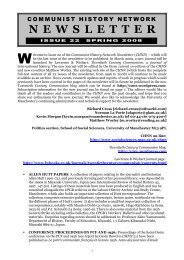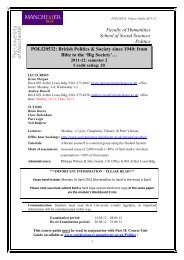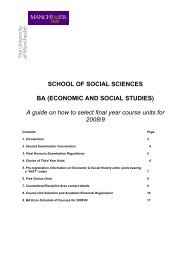second year course outlines 2012-2013 - School of Social Sciences ...
second year course outlines 2012-2013 - School of Social Sciences ...
second year course outlines 2012-2013 - School of Social Sciences ...
You also want an ePaper? Increase the reach of your titles
YUMPU automatically turns print PDFs into web optimized ePapers that Google loves.
All reading lists are for guidance only! The texts listed should help you increase your<br />
understanding <strong>of</strong> the topics covered in the <strong>course</strong>, and help you prepare for the assessed<br />
essay and exam. But you are also encouraged to use your own initiative and find relevant<br />
articles and books by chasing up interesting footnotes, browsing real and virtual libraries,<br />
following your hunches, and so on.<br />
Please note!<br />
1. There are lots additional references for each week’s topic at the back <strong>of</strong> the <strong>course</strong> text<br />
book. Additional references will sometimes be included in the lecture notes as well.<br />
2. The reading list linked to on the front page <strong>of</strong> the Blackboard site is NOT the reading list<br />
for this <strong>course</strong>! (It’s for last <strong>year</strong>’s version.) However it does contain a lot <strong>of</strong> relevant readings<br />
for some <strong>of</strong> the topics – where this is so, it’s flagged in the reading list below.<br />
3. In addition to Bortolotti 2008, there are lots <strong>of</strong> other textbooks that cover some <strong>of</strong> the<br />
same material. These might help you if you are finding a particular topic difficult. For<br />
example:<br />
Alexander Bird, Philosophy <strong>of</strong> Science (London: UCL Press, 1998)<br />
<br />
Alan Chalmers, What is This Thing Called Science? Milton Keynes: Open University<br />
Press, 1982 – or any later edition)<br />
James Ladyman, Understanding Philosophy <strong>of</strong> Science, London: Routledge, 2002.<br />
Available through the library as a Dawson e-book, either to read online or to<br />
download for up to 5 days.<br />
Relevant chapters <strong>of</strong> the Ladyman appear in the reading list below.<br />
4. The reading list is divided into original sources and textbooks/encyclopedia entries. The<br />
latter are there to provide a general overview and suggestions for further avenues to explore;<br />
they are not a substitute for original sources. In your essay and exam you will be expected to<br />
engage with original sources and not simply rely on textbook/encyclopedia material.<br />
5. All <strong>of</strong> the journal articles listed are available online through the University’s e-library. If<br />
you’re having difficulty, please consult<br />
www.socialsciences.manchester.ac.uk/intranet/ug/philosophy/ resources/online/ for some<br />
advice. NB you may have to hunt around for a link that says ‘institutional login’ or ‘login via<br />
Shibboleth’.<br />
6. Many <strong>of</strong> the articles/book chapters (or extracts from them) – plus others that will be<br />
relevant – are also to be found in:<br />
J. A. Cover & M. Curd, Philosophy <strong>of</strong> Science: The Central Issues (New York: W. W.<br />
Norton, 1998)<br />
A couple <strong>of</strong> copies <strong>of</strong> this should appear in High Demand in due <strong>course</strong>.<br />
Original sources<br />
Week 2: What is science?<br />
Kuhn, T. S. 1970. ‘Logic <strong>of</strong> discovery or psychology <strong>of</strong> research?’, in Lakatos, I. & Musgrave,<br />
A. (eds.), Criticism and the Growth <strong>of</strong> Knowledge (Cambridge: CUP, 1970) [there are<br />
photocopies <strong>of</strong> this chapter in High Demand]<br />
Lakatos, I. 1973. ‘Science and pseudoscience’, Lecture; also in his Philosophical Papers, vol.<br />
1 (Cambridge: CUP). [On Blackboard site]<br />
130

















